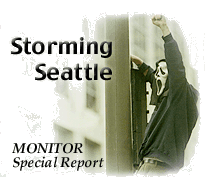
Sidebar: Clinton's Deal With the Unions
by Paul de Armond
 |
by Paul de Armond |
|
President
Clinton admitted the coordinated strategy between the AFL-CIO and the White House in an interview with Seattle Post-Intelligencer reporter Michael Paulson. The interview occurred on Tuesday evening, as the President was between Washington D.C. and San Francisco.
"I think certainly if we'd had it [the protests] any place in the continental United States we would have had the same thing and even if we'd gone to Honolulu there might have been thousands of people there. What I regret is not that there are protesters there. . . What I regret is that a small number of people have done non-peaceful things and have tried to block access and prevent meetings. That's wrong. It's not only illegal, it's just wrong. "I regret very much that a few people have given the protesters a bad name, because I think the fact that the protesters are there, were it not for those stopping meetings, stopping movements and not being peaceful, would be a positive. ". . . And then I think finally there are people who question whether these trading rules are benefiting lower income countries, poor countries, and question whether there is damage to the environment from certain trading arrangements that wouldn't otherwise be there, and who question whether this is a race to the bottom or the top. So that labor unions and wealthier countries want to have certain basic core labor standards observed in poorer countries because they think it will be better for average people so that the trading system actually benefits. So I think that's what is bringing all those people out. ". . . I think that what we ought to do first of all to adopt the United States's position on having a working group on labor within the WTO, and then that working group should develop these core labor standards, and then they ought to be a part of every trade agreement, and ultimately I would favor a system in which sanctions would come for violating any provision of a trade agreement, but we've got to do this in steps. "I do think it is worth noting that the strongest opposition to this position, however, comes from the leaders of developing countries, including a lot of developing countries who have left-wing governments, not right-wing governments, who believe that this is a strategy by the American labor movement to keep them down and keep them poor and keep them from selling products that they'd otherwise be highly competitive in in the American market. It certainly could be used that way. ". . . Again, if we can just get by the few people that aren't being peaceful and the people that are trying to stop people from meeting, I think the presence of others with legitimate questions about the WTO process, the environment and labor and how poor countries are treated, I think this can be a net positive, because we're going to have to build a much deeper consensus for global trade to carry it forward." [Emphasis added.]
|
|
This
interview had a very direct effect on the WTO negotiations. The Post-Intelligencer interview was read by many WTO delegates on Wednesday morning. Roger Downey captured the impact of Clinton's statements in a Seattle Weekly article titled "Clinton Throws Brick:"
When Clinton got up in Seattle and told the ministers that WTO had to clean up its act if it wanted American support, home folks may have nodded sagely in agreement; the delegates could only goggle speechlessly at his hypocrisy. When he dropped the sanctions brick in his P-I interview, they took it to mean that the U.S. proposal of a WTO body to consider worldwide core labor standards was the first step toward establishing compulsory international sanctions against 'violators.' Which is to say that the WTO operated under the same sort of decision-making process as the Direct Action Network protesters -- consultative and consensus-driven. Those who have claimed that the protesters didn't understand the WTO obviously know nothing about either the WTO or the protests.
Albion Monitor
February 29, 2000 (http://www.monitor.net/monitor) All Rights Reserved. Contact rights@monitor.net for permission to use in any format. | ||||||||